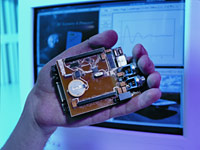|
|||||||||||||||||||||||||||||||||||||||||
| Telecommunications - 8503 | |||||||||||||||||||||||||||||||||||||||||
|
This Program is no longer accepting new enrolments
This program is not available to commencing students. Details below are provided for the reference of continuing students only.
Prospective students should refer instead to the new program, Master of Engineering Science - 8538. Program Coordinator: Dr Tim Moors Please contact the Electrical Engineering and Telecommunications or the Faculty of Engineering for information. Program Objectives and Learning Outcomes Please contact the Electrical Engineering and Telecommunications or the Faculty of Engineering for information.
Major Areas of Study
The program consists of 48 units of credit (UOC) of coursework. Courses satisfying the 48 UOC requirement must be comprised of the following: 1. At least 30 UOC from the postgraduate elective courses related to the area of Telecommunications, including the 18 UOC from the three Core Postgraduate Telecommunications Electives. 2. Remaining UOC may comprise of courses from
One Year 4 Telecommunications Elective
may be selected to make up prerequisite requirements for an area of study within the postgraduate program. These courses are taught by lecture during the day, and require attendance at laboratory sessions. Core Postgraduate Telecommunications Electives are taught in-session at Kensington, and may include a component of web-based learning. However, these courses will require attendance at formal lectures. Completion Time If students attempt successfully 24 UOC per session, the program can be completed in one year. The Postgraduate Telecommunications Research Project must be supervised by a member of the academic staff of the University. Only a limited number of projects are offered. Candidate must enroll in TELE9912 and TELE9913 in consecutive order for the Project Report. Core Postgraduate Telecommunications Electives(offered yearly by the School of EE&T)
Postgraduate Electives
As for program 8501 Supporting Program The Telecommunications Program Coordinator will ensure that each student has prior knowledge equivalent to that embodied in the courses given below. Where such prior knowledge is lacking, candidates may be asked to undertake a qualifying program, usually in the form of a Graduate Diploma, which will ensure that prior knowledge requirements are met. Note that one undergraduate course may be included as part of the requirements for the MEngSc (Telecommunications).
Other Year 4 Telecommunications Professional Electives
Entry Qualifications for Master of Engineering Science (8501, 8503)
A candidate for the degree shall have been awarded a Bachelor of Engineering from the University of NSW in an appropriate discipline, or a qualification considered equivalent from another university or tertiary institution at a level acceptable to the Higher Degree Committee of the Faculty of Engineering (hereinafter referred to as the Committee). Articulation from a UNSW Graduate Diploma, or upgrading from a Graduate Diploma program with advanced standing may be allowed by the Committee. Upgrading in other circumstances may be permitted by the Higher Degree Committee on the recommendation of the Head of School, and may be offered with a reduced level of advanced standing. Upgrading to the MEngSc will be allowed after satisfactory progress and completion of at least 18 units of credit, with advanced standing in courses which meet the requirements for the MEngSc. Progress will not be deemed to be satisfactory unless all courses are passed at the first attempt at Credit level. In exceptional cases, an applicant who submits evidence of such other academic and professional qualifications as may be approved by the Committee may be permitted to enrol for the degree. Where a potential candidate does not meet the prerequisite required knowledge, a qualifying program can be arranged which will generally require enrolment in the Graduate Diploma, with the inclusion of Year 4 Electives. Progression to the MEngSc is subject to the articulation and upgrading rules mentioned above. Enrolment with advanced standing will be permitted where a candidate has completed non-award courses which would otherwise be acceptable for the MEngSc. Enrolment and Progression An application to enrol as a candidate for the degree shall be made on the prescribed form which shall be lodged with the Registrar at least two calendar months before the commencement of the session in which enrolment is to begin. Candidates may commence in Session 1 or Session 2. All candidates elect to study in at least one of the Major programs offered by the School of Electrical Engineering and Telecommunications: each Program Coordinator will advise if applicants are adequately qualified to undertake the proposed courses and must recommend the chosen program to the Committee. A candidate for the degree shall be required to undertake such courses and pass such assessment as prescribed. The progress of a candidate shall be reviewed at least once annually by the Committee and as a result of its review the committee may cancel enrolment, permit the candidate to re-enrol in a Graduate Diploma, or take such other action as it considers appropriate. A candidate will not normally be permitted to re-enrol after failing more than two courses. For information regarding fees for UNSW programs, please refer to the following website: https://my.unsw.edu.au/student/fees/FeesMainPage.html
|
|||||||||||||||||||||||||||||||||||||||||



